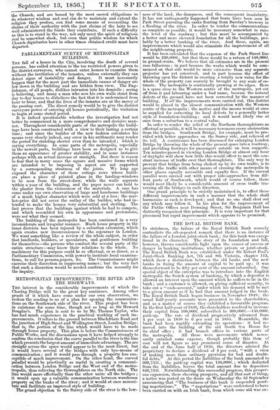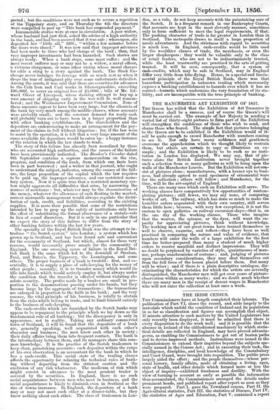THE ROYAL BRITISH BANK.
Iror strictness, the failure of the Royal British Bank scarcely contradicts the oft-repeated remark that there is no instance of the failure of a London joint-stock bank ; for this bank was excep- tional in its character. The story of its foundation and fall, however, throws considerable light upon the causes of success or danger in banking institutions, whether private or joint-stock. The Royal British Bank was established under Sir Robert Peel's Joint-Stock Banking Act, 7th and 8th Victoria, chapter 113, which drew a distinction between the old banks and the new banks in fixing the amount of capital to be paid up ; it was thenceforward to be fifty per cent of the amount subscribed. One special object of the enterprise was to introduce into the English metropolis the Scotch system of banking, by which a depositor is allowed an interest upon the amount which he suffers to lie in the bank ; and a customer is allowed, on giving sufficient security, to take out a "cash-account," under which his demand will be met to a given amount as if he had that amount lodged in the bank. The Royal British Bank began business in November 1849; the usual half-yearly accounts were presented to the shareholders, and as a matter of course they exhibited a favourable progress. In the first half-year of 1856, the shareholders resolved to increase their capital from 100,000/. subscribed to 300,000/.-150,000/. paid-up. The rate of dividend progressively advanced from 4 per cent in 1850 to 6 per cent in 1855. Meanwhile, the bank had been rapidly extending its operations : it had re- moved into the building of the old South Sea House for its chief office ; it had branch offices in various parts of
the metropolis. All these were movements which neces- sarily entailed some expense, though probably this item of cost will not figure as any prominent cause of disaster. At the end of the June half of 1856, the directors advised the proprietary to declare a dividend of 4 per cent, "with a view of making more than ordinary provision for bad and doubt- ful debts." At this period the liabilities of the bank amounted to 999,735!.; the paid-up capital was 150,000!.; which deducted from the liabilities, leaves the total amount due to depositors 849,735/. Notwithstanding this successful progress, this prosper- ous expansion, these cheering prospects, and all that sort of thing, a notice was posted on the doors on Wednesday the 3d September announcing that "The business of this bank is suspended pend- ing negotiations." The "negotiations" were understood to have been tarried on with an Irish bank, from which some aid was ex-
pected ; but the conditions were not such as to secure a repetition of the Tipperary story, and on Thursday the 4th the directors were compelled to post up "This bank has suspended payment." Innumerable stories were at once in circulation. A poor widow, whose husband had just died, asked the advice of a high authority in the bank, and had been assured that it was safe ; whereupon, she deposited her "little all," 3201., "within a few minutes before the doors were closed." It was now said that improper advances had been made to those who had charge of the bank ; then, that very improper investments had been hazarded. Such stories are always ready. When a bank stops, some must suffer ; and the most recent sufferer may or may not be a widow, a naval officer, a virtuous clergyman, or some other victim whose moral charac- ter adds a sting to a story against the bank. The Stock Ex- change never indulges its revenge with so much zest as when it drops the tear of indignant pity over some unfortunate defaulter. Among the assets, it was said that there are securities for advances to the Cefn Iron and Coal works in Glamorganshire, exceeding 100,0001. to cover an original loss of 25,0001.; bills of Mr. Ed- ward Oliver of Liverpool, whose dashing attempt to buy up a vast amount of shipping early in the war will be well remem- bered; and the Westminster Improvement Commission. None of these amounts appear to have been very large, but the clientele of the bank lay very much among the middle-classes, whose accounts were probably small; and the constant demand for ready cash will probably turn out to have been in a larger proportion than
with other 'banking establishments. The shareholders and the depositors are endeavouring to make an arrangement for the pay-
ment of the claims in full without litigation ; for, if the law were to assist in the operation, it is felt that a very large amount of the sums available for depositors would be eaten up : a happy instance of the relation in which the law stands to trade.
The story of this failure has already been moralized by those who are accounted high authorities, and the causes of the failure
have been provisionally indicated. The Banker's Circular dated 6th September contains a copious memorandum on the rise, progress, and condition of the bank, from which our facts have
been in part borrowed ; and a writer in that journal, who ought to understand the subject, indicates, among the causes of the fail- ure, the large proportion of the capital which the law requires
to be paid up, the improper advances' and our restricted mone-
tary system. Now it is quite true that a restricted monetary sys- tem might aggravate all difficulties that arise, by narrowing the
sources of assistance : but, whatever may be the denomination of
the money, whatever the allowance of cash floating in the market, correct mercantile management would always regulate the distri- bution of cash, credit, and liabilities, according to the existing supplies. It is more than possible that some of the restrictions intended by law to prop up the safety of institutions only have the effect of substituting the formal observance of a statute-rule in lieu of sound discretion. But it is only in one particular that we expect the story of this failure to differ from the story of other banking failures within the last few years. The specialty of the Royal British Bank was the attempt to in- froduce the Scotch system" into London ; a system which has grown up in Scotland, and has been found safe and convenient
for the community of Scotland, but which, almost for those very reasons, would necessarily. prove unsafe for the community of
England. The one sweeping cause of failure in the Royal Bri- tish Bank is the same which led to the downfall of Strahan, Paul, and Bates's, the Tipperary, the Leamington and some others. The proper business of a bank is twofold : first, and es- sentially, it is to supply a place of safe-keeping for the money of other people ; secondly, it is to transfer money which would lie idle into hands which would actively employ it, but always under the condition that the transfer is effected without violating ab- solute security. The profits made by a banker are small in pro- portion to the denominations passing under his hands, but they
become large by the aggregate of transactions the transactions are enlarged in proportion to the faith in his bank; and the very essence the vital principle of his business is totally to abstain from the risks which belong. to trade, and to limit himself entirely to the business of safe-keeping.
The cash-credits which are furnished by the Scotch banks may appear to be repugnant to the principle which we lay down as the fundamental rule of all banking but the discrepancy is only in
appearance, not in reality. Taking any ordinary commercial town of Scotland, it will be found that the depositors of a bank
are, generally speaking, well acquainted with each other's character and business ; the men know each other in society ; their daily affairs bring them into frequent contact. The bank is the intermediary between them, and its managers share this com- mon knowledge. It is the practice of the Scotch tradesmen to keep clear, painstaking accounts ; each depositor within the range of his own observation is an accountant for the bank in which he has a cash-credit. This social state of the trading classes affords the opportunity for relaxing the technical rules of bank- ing without departing from the strictest caution and the
exclusion of anyi risk whatsoever. The modicum of risk which might consist in advances to the most prudent trader is
covered by the securities. In England, there is no such social acquaintance between men who meet in business, and the social acquaintance is likely to diminish even in Scotland as the size of towns increases. In England, the depositors of a bank may or may not meet each other at a dinner-table, but they know nothing about each other. The class of tradesmen in Lon-
don, as a rule, do not keep accounts with the painstaking care of the Scotch. It is a frequent remark in our Bankruptcy Courts, that accounts are kept in the most slovenly manner, sometimes only in form sufficient to meet the legal requirements, if that. The pushing character of trade is far greater in London than in Scotland. The metropolis draws to itself a large proportion of needy adventurers. And the strictness with regard to _ securities is much less. In England, cash-credits would be little used by the wealthier classes of trade, the merchants, or even the larger shopkeepers : they would be valuable only to the class of retail traders, who are not to be indiscriminately trusted, while the least trustworthy are practised in the -arts of getting trusted. It will be seen, consequently, that a system of cash-credits, which may be safe in Scotland, may in England differ very little from kite-flying. Hence, in a special and funda- mental principle of the Royal British Bank, there was that hazardous participation in unknown trading which necessarily exposes a banking establishment to hazards over which it has no control—hazards which undermine the very foundation of its sta- bility, and are incompatible with the true principle of banking.



























 Previous page
Previous page